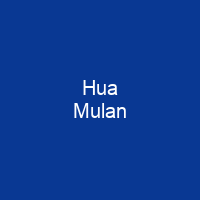Mulan is a fictional folk heroine from the Northern and Southern dynasties era of Chinese history. According to the legend, Mulan takes her aged father’s place in the conscription for the army by disguising herself as a man. In Chinese, her given name literally means’magnolia’ and her family name is ‘Zhu’ or ‘Wei’
About Hua Mulan in brief

The Northern Wei was founded by the Tuoba clan of ethnic Xianbei who united northern China in the 4th century and became partially sinified as they ruled and settled the northern steppes. The Chinese dynasty took on their own surname and moved the capital from Pingcheng, modern day Shanxi Province, to modern day Datong, Luoyang Province, south of the Yellow River, in the Central Plain, the heart of China. Mulan may have been the sinified version of the Xian bei word, ‘umran’, which means prosperous. There is still a debate whether Mulan is an historical person or just a legend, as her name does not appear in Exemplary Women.
You want to know more about Hua Mulan?
This page is based on the article Hua Mulan published in Wikipedia (as of Dec. 06, 2020) and was automatically summarized using artificial intelligence.







